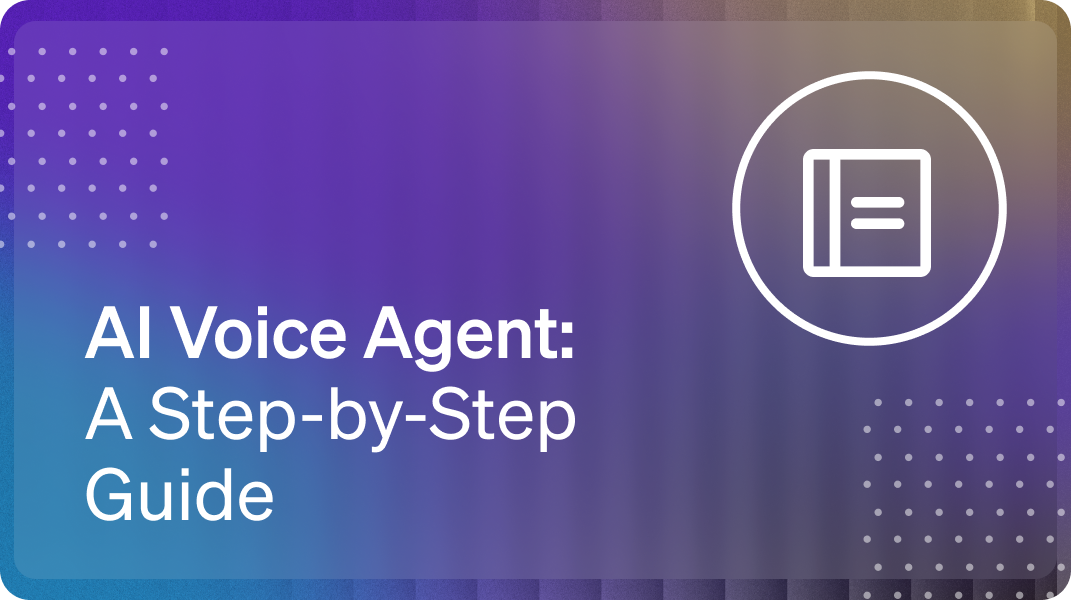Conversational experiences transform how businesses connect with customers, enabling intuitive, dialogue-based interactions across platforms. Instead of static, transactional exchanges, these experiences create dynamic, personalized engagements. As organizations strive to improve customer satisfaction and loyalty, conversational experiences are critical in customer service, sales, and beyond.
This guide explores artificial intelligence (AI) conversational interfaces, their role in customer interaction, and how they benefit enterprises. Whether you're new to this concept or looking to enhance your current automation approach, this introduction provides valuable insights into why conversational experiences matter and how they can elevate customer engagement.

What Is a Conversational Experience?
Conversational experiences allow users to interact with businesses through natural language powered by generative AI and contextual understanding. Unlike traditional interfaces that rely on rigid menus or forms, this advanced technology creates fluid, adaptive dialogues across text, voice, and other channels.
For example, when a user contacts a customer service assistant, the interaction doesn’t feel like completing a digital form. Instead, it mimics a genuine conversation, where the assistant draws on past interactions, preferences, and what the customer needs to deliver relevant, personalized responses. This conversational approach isn’t limited to customer service; it enhances multiple areas within an organization:
- Customer service: AI assistants manage inquiries, troubleshoot issues, and provide support, ensuring seamless customer experiences.
- Sales and marketing: Assistants engage prospects with personalized recommendations, answer product questions in real-time, and guide users through purchases, driving conversions.
- Human resources: HR assistants handle employee onboarding, benefits inquiries, and policy FAQs, reducing administrative overhead while improving response times.
- IT and internal operations: Assistants streamline IT requests like password resets and system access, enabling IT teams to focus on higher-value tasks.
- Compliance and legal: Conversational AI helps navigate regulatory requirements by automating data-gathering processes and ensuring documentation is accessible and complete.
Organizations can create a cohesive, personalized experience that enhances productivity, engagement, and customer satisfaction by applying conversational AI across departments.
Examples of conversational experiences
Conversational experiences transform how businesses interact with customers, providing omnichannel, AI-powered dialogues across various applications and industries. These examples demonstrate the impact of conversational AI:
AI chatbots
AI chatbots handle routine customer inquiries, simplify tasks, and streamline workflows.
- Customer support: Chatbots guide users through troubleshooting common issues, like resetting passwords or resolving connectivity problems.
- Product discovery: E-commerce platforms use chat apps to recommend products based on user preferences and browsing history, increasing sales and customer satisfaction.
- Self-service options: Businesses can reduce contact center agent workloads by enabling chatbots to answer frequently asked questions like shipping details or order status.
Voice assistants
Voice-enabled AI makes interactions faster and more convenient, enhancing accessibility and user experience.
- Appointment management: Patients in the healthcare sector can schedule appointments or receive reminders through voice assistants without navigating complex web interfaces.
- Hands-free assistance: Telecommunications providers empower customers to check their account details, upgrade plans, or troubleshoot issues using voice commands while multitasking.
- Interactive shopping: Retailers integrate voice assistants to help customers locate products in stores or place online orders with minimal effort.
Conversational IVRs
Traditional IVRs often frustrate users. Conversational IVRs replace rigid menus and long options with responsive, human-like interactions.
- Streamlined customer service: Banks use conversational IVRs to authenticate users, provide balance updates, and even guide them through loan applications-all within a secure, seamless environment.
- Telecom services: Customers easily manage account settings, report service outages, or modify subscriptions by speaking naturally instead of pressing numbers on a keypad.

Industries Leading the Adoption of Conversational Experiences
Several sectors are pioneering conversational experiences to enhance operations, improve engagement, and meet growing customer expectations:
- Financial services: Banks and insurance companies rely on AI assistants for secure, personalized customer interactions. Fast, reliable conversational AI solutions benefit tasks like fraud detection, account management, and claims processing.
- Telecommunications: Telecom companies use conversational experiences to handle large customer inquiries about billing, service issues, and device support. Multi-channel chatbots ensure consistent support across apps, websites, and voice platforms.
- Healthcare and patient support: Healthcare providers use AI to improve patient engagement. Conversational assistants handle appointment scheduling, medication reminders, and patient FAQs, reducing administrative workloads while ensuring timely care. This reduces administrative workload for staff while ensuring patients get timely, accurate information.
- Retail and e-commerce: Retailers leverage AI-driven conversations to guide customers through personalized shopping experiences. Chatbots handle product searches, FAQs, and post-purchase support, creating a seamless journey from browsing to checkout.
Why Are Conversational Experiences Important for Modern Businesses?
Customers now expect interactions to be smooth, personalized, and omnipresent. Conversational experiences enable businesses to meet these expectations by providing user-friendly, consistent dialogues across multiple platforms. Beyond convenience, they foster deeper engagement, strengthen customer loyalty, and help businesses stand out in competitive markets.
Personalized customer journeys
Conversational experiences use custom interactions designed for each user's unique journey. By analyzing customer data including past behavior, preferences, and real-time context, AI-powered assistants create individualized experiences that feel relevant and valuable.
For example, an e-commerce assistant might recommend products based on a customer's browsing history and recent purchases, creating a highly customized shopping experience that drives conversions.
Multi-channel integrations
Today’s customers engage across multiple web, mobile, social media, and voice channels. Conversational experiences unify these touchpoints, ensuring interactions flow seamlessly. For example, a user might begin a live chat support request and continue the conversation through a voice assistant without losing context. Notifications can also be used for proactive outreach on messaging apps.
To achieve this consistency, businesses need platforms like Rasa, which allow seamless handoffs between channels while maintaining user data and dialogue history.
How Conversational Experiences Improve Customer Engagement and Satisfaction
Conversational experiences streamline processes and enhance how businesses connect with their customers. By making interactions easier and more intuitive, they improve satisfaction while creating opportunities for deeper engagement.
Faster response times
Speed is critical in customer service. Conversational AI platforms respond instantly to questions, eliminating wait times and addressing multiple queries simultaneously. For example, a telecom provider could deploy a conversational assistant to handle questions about billing, outages, or plan upgrades-all at once, 24/7.
Higher customer retention
Frequent, personalized interactions strengthen the customer experience. You can build trust by making users feel heard and valued. Businesses that deliver consistent and reliable interactions see higher loyalty and repeat engagement.
Better understanding of customer needs
Conversational experiences provide businesses with valuable insights into customer preferences and pain points. By analyzing dialogue data, companies can refine their strategies, enhance offerings, and ensure every interaction addresses real customer needs.
Additionally, using platforms like Rasa ensures that these interactions remain free of hallucinations-responses generated without grounding in accurate data-enhancing safety and trust. This reliability builds confidence in both customers and internal teams, ensuring that AI-powered dialogues deliver consistent, dependable, and actionable results across all touchpoints.
Improved sales and conversion rates
Engaging, personalized dialogues drive sales by guiding customers through product discovery or upselling opportunities. For example, a retail assistant can recommend complementary products during checkout or answer questions that might otherwise prevent a purchase.
Create Personalized Conversational Experiences with Rasa’s Platform
Rasa empowers enterprises to build conversational experiences that fit their unique workflows and customer needs. Unlike one-size-fits-all solutions, the Rasa Platform adapts to your business’s complexity. Whether your focus is on sales, customer support, or internal processes, we ensure your AI assistant aligns seamlessly with your objectives.
Flexible architecture for custom solutions
Rasa’s flexible architecture allows enterprises to create conversational AI assistants that handle complex workflows and adapt dynamically to user inputs. From managing multi-step dialogues to addressing nuanced customer inquiries, we support natural and personalized conversational support. Our infrastructure helps you meet evolving business needs, ensuring your assistant scales alongside your operations.
Features for enhanced conversational experiences
The Rasa Platform is built to handle modern enterprise demands, offering features that set us apart:
- Conversation repair: With Rasa, interruptions or unexpected changes in dialogue are no longer a problem. The assistant recognizes deviations and recovers smoothly, maintaining context and ensuring accurate resolutions without frustrating the user.
- LLM-agnosticism: Enterprises can select and switch between large language models (LLMs), enabling access to cutting-edge AI technology while avoiding vendor lock-in. This ensures your AI remains adaptable to new advancements in the field.
- Multi-channel support: Rasa delivers consistent experiences across web, mobile, messaging platforms, and voice channels. Businesses can deploy one assistant across multiple touchpoints, offering customers a seamless journey regardless of the communication medium.
- No-code interface: Rasa Studio simplifies the process of building and refining conversational flows, enabling collaboration between developers and non-technical teams. Teams can easily design, test, and iterate conversational design without extensive coding knowledge.
- CALM (Conversational AI with Language Models): Rasa’s CALM approach leverages LLM efficiency while maintaining precise control over business logic. This ensures conversations are accurate, reliable, and free from hallucinations, even in high-stakes industries.
Scaling personalization across use cases
Rasa’s platform isn’t just for customer-facing interactions-it’s equally effective for internal workflows. From IT helpdesks managing password resets to HR bots handling employee onboarding, Rasa ensures personalized and efficient responses for various scenarios. Enterprises in finance, insurance, telecommunications](https://rasa.com/customers/orange/) and more industries use Rasa to meet strict compliance requirements while delivering exceptional personalized experiences.
Built for enterprise demands
Rasa offers on-premise deployment options, providing unmatched data security and control for regulated industries. Businesses retain data ownership and can comply with standards like GDPR and HIPAA without sacrificing functionality or scalability. Rasa’s modular architecture integrates seamlessly with CRMs, ERPs, and other enterprise tools, ensuring your assistant becomes a vital part of your ecosystem.
Unlock the Power of Personalized AI
With Rasa, you can go beyond generic templates to build conversational experiences that truly resonate with users. Enterprises can deliver impactful interactions that drive engagement and satisfaction by leveraging advanced features like conversation repair, LLM-agnosticism, and multi-channel support.
Ready to elevate your customer engagement? Connect with Rasa today to learn how our platform can help you design personalized, scalable conversational experiences that transform your business.





